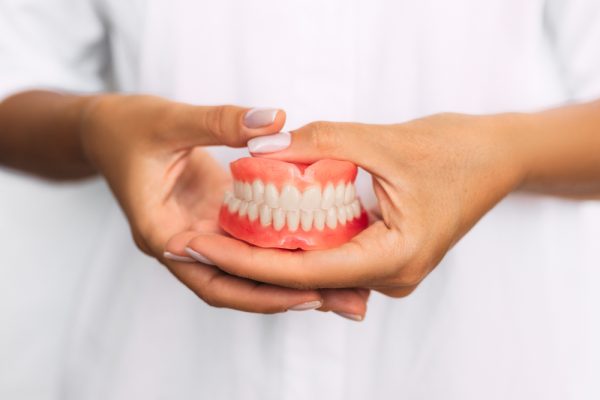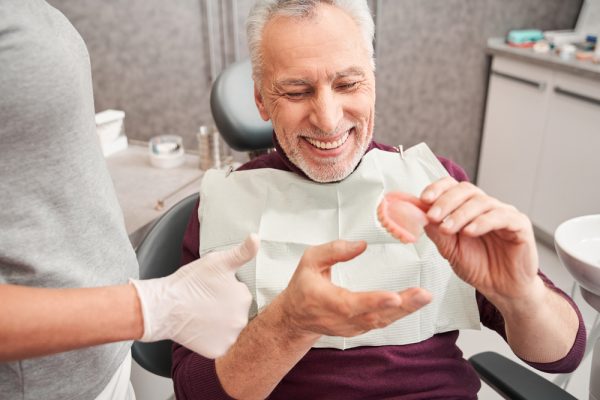Is It Time To Reline Your Dentures?
Table of Contents
Relining dentures is necessary for maintaining the comfort, fit, and function of your dentures. Over the years, the shape and structure of your mouth change, causing your once-fitting dentures to fit less securely, leading to discomfort and possible health issues. Relining your dentures can restore their fit, extend their lifespan, and improve your overall oral health.
You don’t want to deal with ill-fitting dentures. To reline your dentures, contact our Seattle dentists today at (206) 682-3888. We’ll schedule an appointment and get your dentures back to fitting properly.
What Is Denture Relining?
Denture relining is a process that involves reshaping the underside of your dentures to better fit the current contours of your mouth. When you first get dentures, they’re custom-fitted to your gums; however, as time goes on, your gums and jawbone can change due to bone resorption (bone loss), causing your dentures to become loose and uncomfortable. Relining helps fill in these gaps, restoring stability, comfort, and function.
Why Do Dentures Need to be Relined?
The primary reason for denture relining is to adjust the fit after changes in the jawbone and gum tissue, which are especially common in the first few years after tooth loss. As your jawbone changes, your dentures become loose, making it harder to chew, speak, and maintain comfort. Other reasons for relining include:
- Prolonged denture wear: Frequent use can cause the material to wear down, altering the fit.
- Oral health changes: Gum tissue changes due to aging, illness, or lifestyle factors.
- Injury or trauma: Accidents affecting your mouth can change the structure of the jaw or gums.

Types of Denture Relines
Soft Denture Reline
Soft relines use a more flexible, softer material to create a cushion between the gums and the denture base. Soft relines are especially beneficial for patients with tender or sore gums.
Pros of Soft Denture Reline:
- Offers greater comfort, especially for patients with sensitive gums.
- The soft material adjusts better to changes in the mouth.
- Allows patients to continue wearing dentures more comfortably.
Cons of Soft Denture Reline:
- Needs to be replaced more frequently than a hard reline.
- Not as durable as a hard reline.
Hard Denture Reline
A hard reline involves reshaping the denture’s base with a hard resin material similar to the original denture base. This type of reline is durable and long-lasting, making it ideal for patients seeking a stable and strong fit.
Pros of Hard Denture Reline:
- Provides a more permanent and stable solution.
- Lasts longer than other types of relines.
- Feels more like the original fit.
Cons of Hard Denture Reline:
- It can be uncomfortable for patients with sensitive gums.
- Takes longer to complete than a soft reline.
Temporary Reline
A temporary reline, also known as a therapeutic reline, is often used when there is significant irritation, inflammation, or infection of the gums. This reline uses a medicated, soft material to help soothe the gums and promote healing.
Pros of Temporary Denture Reline:
- Allows for healing if gums are sore or infected.
- Provides temporary comfort while addressing gum issues.
Cons of Temporary Denture Reline:
- Only a short-term solution.
- Requires follow-up to transition to a hard or soft reline.
The Denture Relining Process
Step 1: Consultation and Assessment
The first step involves a consultation with our dentist in downtown Seattle. We’ll examine your mouth, assess the fit of your dentures, and discuss the best reline option for your specific needs.
Step 2: Preparing the Denture
Our Seattle dentist will remove a thin layer of material from the denture base, making room for the reline material. This step is essential to ensure that the new material bonds well and achieves the best fit.
Step 3: Application of the Reline Material
Depending on the type of reline, our dentist will apply a layer of soft or hard reline material to the underside of the denture. The denture is then placed in your mouth to shape the material to the contours of your gums.
Step 4: Setting and Finishing
Once the material has been set, Dr. Johnson will smooth and polish the relined denture. The result should be a snug, comfortable fit that matches the current shape of your gums.

Benefits of Relining Dentures
Enhanced Comfort
A snug fit provided by relining reduces the pressure on your gums, making it much more comfortable to wear your dentures daily.
Improved Stability
Relining restores the stability of your dentures, making it easier to eat, talk, and engage in social activities without worrying about slippage.
Better Oral Health
Relining can prevent sores and irritation caused by loose dentures, which can lead to infections and other oral health issues if left unaddressed.
Cost Savings
Regular relining can extend the life of your dentures, allowing you to delay the need for a new set. This can save you money in the long run by minimizing the need for repairs or replacements.
How Often Should Dentures Be Relined?
Most dentists recommend having dentures relined every 1 to 2 years, but this can vary based on individual needs and the type of reline used. Regular relining can help prolong the life of your dentures and maintain comfort and stability.
Signs You Need Denture Relining
Relining is usually needed when you start noticing any of the following signs:
- Loose dentures: If your dentures move around or slip when speaking or eating.
- Sore spots: Pain or irritation from dentures rubbing against your gums.
- Difficulty chewing: Food becoming harder to chew can indicate a poor fit.
- Changes in speech: Changes in how you speak or difficulty pronouncing certain words.
Denture Relining Cost
In the United States, the cost of soft relines typically ranges from $300 to $500, while hard relines generally cost between $200 and $450. Temporary relines are usually less expensive, costing around $100 to $200. The average costs vary depending on the type of reline you choose, with each option offering different benefits and longevity.
How Long Do Denture Relines Last?
The lifespan of denture relines varies based on the type used and the care taken. Here’s a breakdown of the different types:
- Soft relines: These need to be done every one to two years, depending on wear and maintenance.
- Hard relines: Can last from one to two years with proper care.
- Temporary relines: Designed for short-term use, typically lasting only a few weeks.
Post-Reline Care for Dentures
Cleaning Relined Dentures
Cleaning relined dentures requires a gentle approach to avoid damaging the new material. Use a soft-bristled brush and avoid regular toothpaste, which can be too abrasive. Proper cleaning ensures the longevity and hygiene of your dentures, maintaining their comfort and functionality.
Avoiding Denture Adhesive
Avoiding denture adhesive immediately after a reline is crucial as it allows the new material to set and bond properly with the denture. Using adhesive too soon can disrupt the reline, leading to discomfort and a poor fit.
Regularly scheduled check-ups help assess the fit and make necessary adjustments, reducing the need for adhesives. Good oral hygiene and following post-reline care practices also contribute to comfortable, well-fitting dentures.
DIY Relining vs. Professional Relining
While DIY denture relining kits are available, professional relining is highly recommended. Here’s why:
- Precision: Dentists use advanced tools and materials for an accurate fit.
- Durability: Professional relines last longer and offer better performance.
- Safety: DIY kits may cause damage to your dentures or irritate your gums.

Frequently Asked Questions
Denture relining usually takes one to two hours if done in-office, but some types may require sending the dentures to a dental lab, which can take a few days.
Most types of dentures can be relined, including partial and full dentures. However, some materials, like flexible dentures, may not be suitable for traditional relining.
Schedule Your Appointment!
If your dentures feel uncomfortable or don’t fit like they used to, it’s time to consider a denture reline. Schedule an appointment with our skilled dental team to find the best relining option for you. Whether you need a hard, soft, or temporary reline, we’re here to help you restore your confidence and improve your oral and overall health.
Denture wearers looking for relining services can contact our dentist in Seattle, WA, today by calling (206) 682-3888 for an appointment. Your dentures fit will be as good as new in no time.
